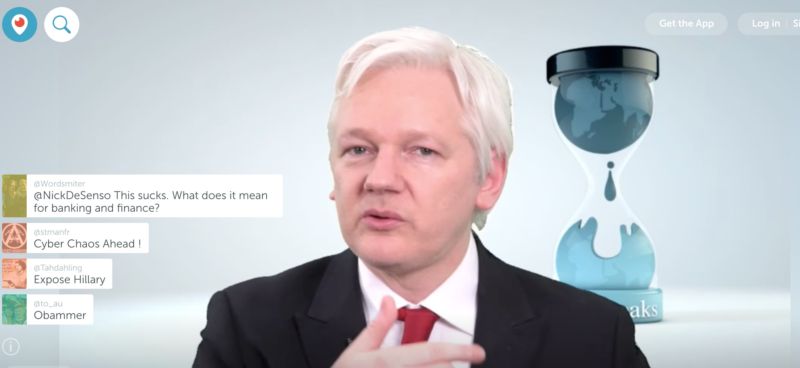Assange: Cache of cyber weapons was passed around "out of control" by contract hackers.

Julian Assange in his video press conference on Periscope on March 9.
In a video statement on Periscope today, Assange asserted that the CIA "lost control of its entire cyber-weapons arsenal. Now, this is a historic act of devastating incompetence to have created such an arsenal and stored it all in one place and not secured it." Assange repeated the claim that WikiLeaks had stumbled upon the archive "as the result of it being passed around a number of different members of the US intelligence community out of control in unauthorized fashion."
When Assange released the first wave of documents, from what is apparently a recent archive from an internal CIA developer collaboration server, he did a number of things that WikiLeaks hasn't done in the past. Perhaps in response to some of the criticism leveled against WikiLeaks from others—including NSA whistleblower Edward Snowden—Assange and WikiLeaks largely redacted personal details of CIA employees from the dump. The group also held back the archives of the tools themselves (publishing instead text files with a list of the archives' contents). Assange has taken the position that this leak is primarily about protecting computer users around the world from the use of the tools that are part of the leak. He also insinuated WikiLeaks had evidence that the CIA spied on US citizens—or at least had implants on systems with US IP addresses.
In response to Assange's accusations, the CIA issued a statement:
As we've said previously, Julian Assange is not exactly a bastion of truth and integrity. Despite the efforts of Assange and his ilk, CIA continues to aggressively collect foreign intelligence overseas to protect America from terrorists, hostile nation states, and other adversaries.
State of play
Assange said he had been contacted by a malware researcher who believed that his Apple Macintosh computer was infected by the QuarkMatter malware described in the CIA documents (it's an implant that infects the EFI partition of a Mac's storage device). Based on the documents leaked by Assange and WikiLeaks, that implant was still largely a work in progress. "It lools like not only is [the CIA arsenal] being spread around contractors and former American computer hackers for hire, but now maybe around the black market or being used by these American hackers who sometimes, you know cross both sides of the fence—they're called grey hats—for attacking others," Assange said.Assange also noted that while WikiLeaks was not yet publishing the tools themselves, he and WikiLeaks would share the exploits with the targeted companies in order to help them protect against attacks. Assange then accused the CIA of covering up the leak and causing damage to those companies with what he claimed was "what appears to be the largest arsenal of Trojans and viruses in the world, that attacks most of the systems that journalists, people in government, politicians, CEOs, and average people use."
Assange cited a few reports, such as one from Reuters yesterday, that reported the CIA had been aware of a breach at the end of last year. He said such stories show it was clear the CIA knew "that it had lost that material, or that we had that material, and has not disclosed that—to the public at least, not warned the public that there's [a] loose weapons arsenal out there… It's a very interesting question, I think, about who was told in government and when. Did [the CIA] tell Barack Obama? Did Obama know during the election and after the election? Did he tell President Trump? And why did the CIA not warn Apple, Microsoft, and other systems manufacturers?"
The CIA, as a matter of policy, will not acknowledge or deny the legitimacy of the leaked documents. But CIA spokesperson Jonathan Liu told Ars:
We have no comment on the authenticity of purported intelligence documents released by Wikileaks or on the status of any investigation into the source of the documents. However, there are several critical points we would like to make: CIA’s mission is to aggressively collect foreign intelligence overseas to protect America from terrorists, hostile nation states and other adversaries. It is CIA’s job to be innovative, cutting-edge, and the first line of defense in protecting this country from enemies abroad. America deserves nothing less.
It is also important to note that CIA is legally prohibited from conducting electronic surveillance targeting individuals here at home, including our fellow Americans, and CIA does not do so. CIA’s activities are subject to rigorous oversight to ensure that they comply fully with U.S. law and the Constitution.
The American public should be deeply troubled by any Wikileaks disclosure designed to damage the Intelligence Community’s ability to protect America against terrorists and other adversaries. Such disclosures not only jeopardize US personnel and operations, but also equip our adversaries with tools and information to do us harm.
Source